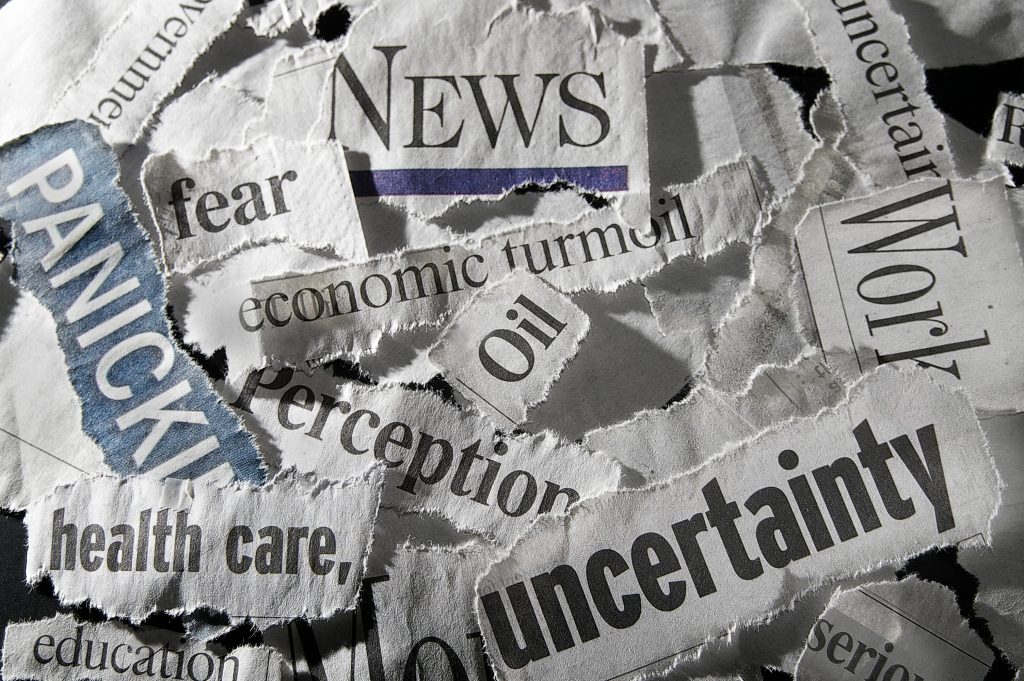In a twist on a modern theme, it’s my kids who are worried about my media consumption. The news, to be specific. They harangue me on family vacations to turn it off, put it down, and shut it out. If only it were so easy.
I try to tell them it’s my job, but I understand their concern. Increasingly, I share it. For the truth is, it seems relentlessly grim out there. And I’m not even talking about social media, which these days resembles Tennyson’s description of nature as “red in tooth and claw.”
I am a member of a shrinking minority: a lifelong newspaper reader who starts each morning folding over those big billowy pages covered in type as I find out about all the disasters, coups, and other horrors judged fit to print. I may be eating Raisin Bran for my health, but my cortisol levels are through the roof before I’ve gotten to the sports section.
Not willing to stop at breakfast, however, I also read online news sources, watch the evening news, and listen to NPR in the car. One of my daughters recently told me that when she was a child, listening to NPR’s Morning Edition as I made her breakfast was a traumatic experience.
I’m beginning to feel a bit traumatized myself. On any recent day, the front page headlines include pandemic news (hello Omicron), climate change trends (goodbye coral reef), Chinese, Russian, and/or Iranian threats (so long world peace), political standoffs (ta-ta for now bipartisanship), and the occasional earthbound asteroid. It can be quite a morning slog.
Fellow news junkies confess to me they are feeling similarly. There are a variety of strategies for dealing with the growing phenomenon of news overdose. Some are stopping cold turkey, apparently choosing ignorance over anxiety. Others have taken to just scanning the headlines. Still others may watch only the evening news, which on the major networks is a pretty thin information diet on the best of days.
Finally, there are those who get their updates from Stephen Colbert and John Oliver, though I’m not sure that laughing at their punchline cynicism makes the news itself any more palatable.
The easiest to give up are the cable news shows, which are light on news and heavy on opinion anyway. One of the most memorable homilies I ever heard was by a priest who called our attention to the many wives coming to him to complain about their husbands’ news habits. They watch cable news all day or all night, the wives tell him, and then stalk about the house in a constant rage. “This anger is not of God,” the priest thundered from the pulpit, glaring at the guilty lot of us.
Despair is not of God either. I recently heard (on NPR) the tragic story of a young man so concerned about the state of the planet and the drumbeat of news about climate change that he lost hope and took his own life.
What seems to typify so many of us these days is a pessimism of the moment, a kind of apocalyptic fixation that we are surely living in the worst of times. We luxuriate in our despair: Our country is in decline. Our world is stewing in the environmental excesses of our species. Even our Church is splintering.
All of which is to say that this year I really need to embrace Advent. Advent is a time of expectation, a time of hope. The Jewish people hoped for a Messiah, and the Advent readings are rich with the sense that his coming was imminent.
In the readings for the third Sunday of Advent, I hear words directed at me: First from Zephaniah, “Fear not, O Zion, be not discouraged!” And then Philippians exhorts me: “Have no anxiety at all. …”
To our modern, world-weary ears, these words are both balm and rebuke. What message do we have if not hope? What can we offer if not the joy of salvation? And what does the world need now if not an invitation from us to believe?
Our problem may not be the news. Our problem is how easily we forget the good news. These days, we need to hope: hope in the Lord and hope in one another, that we are not the sum total of our misdeeds.
This Advent, let’s focus on the signs of hope. The quiet witnesses of grace who work in food pantries and soup kitchens. The angels of mercy in our ERs and ICUs. The self-sacrificing priests, and women religious, but also the parents and grandparents who are themselves testaments in word and deed of their faith that God is with us always. Emmanuel.

